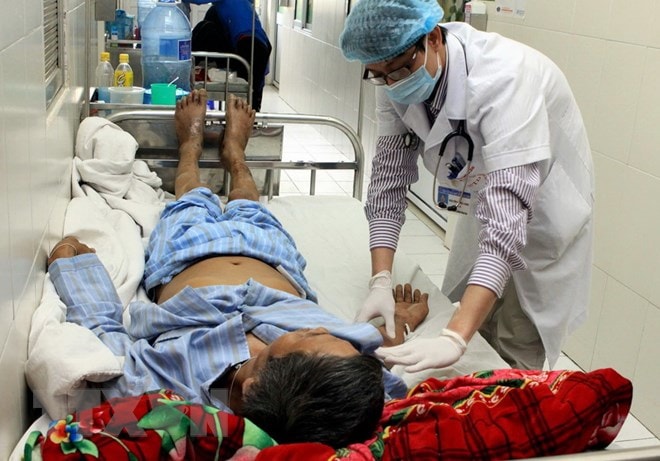Eating pig's blood pudding during Tet, a patient had to be hospitalized for emergency treatment
On February 18, Lai Chau General Hospital received a patient in a deep coma, with purple patches on his face and respiratory failure.
 |
| A patient infected with Streptococcus suis is being treated at the Central Hospital for Tropical Diseases after eating pig's blood pudding. (Illustration photo: Duong Ngoc/VNA) |
Doctor Phan Van Dinh, on duty at the emergency room at Lai Chau General Hospital, said the patient was Vang Van Ta, born in 1984, in Lang village, Ban Lang commune, Phong Tho border district.
Relatives said that on the 30th of Tet, the family slaughtered a pig and made blood pudding for the brothers, including Vang Van Ta, to eat together.After that, Mr. Ta had a slight fever and difficulty breathing. His family thought that due to the change in weather, Ta had the flu. On February 17 (the second day of Tet), the patient had a high fever, vomiting, diarrhea, and fatigue.
On the morning of February 18 (the third day of Tet), the patient's family discovered that he was in a coma, with bruises on his face and arms, and immediately took him to the Provincial General Hospital.
The patient was admitted to the hospital in a coma, respiratory failure, rapid pulse, and low blood pressure.
Upon admitting the patient, the doctors of the Infectious Diseases Department administered intravenous fluids to raise blood pressure, used antibiotics, and applied an aggressive treatment regimen. The initial diagnosis was based on the patient eating raw blood pudding, and the doctors suspected the patient had a foodborne infection.
With the patient's prognosis showing bad developments, Lai Chau Provincial General Hospital consulted and completed procedures to transfer the patient to the Central Tropical Hospital for continued treatment.
According to long-standing customs in the mountains, many ethnic families often slaughter pigs and make blood pudding to eat during Tet.
Doctor Phan Van Dinh, Lai Chau General Hospital, recommends that to ensure the health of yourself and your family, especially during holidays and Tet, people need to follow a diet that ensures food hygiene and safety, especially using cooked food, and should not eat meat from animals that are infected or suspected of being infected.
